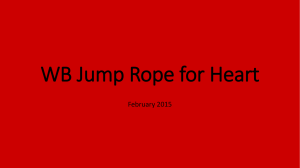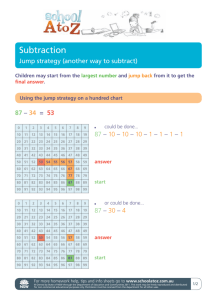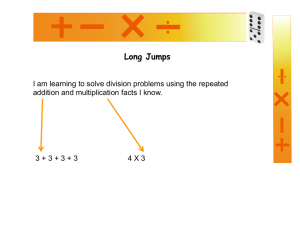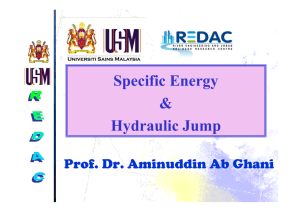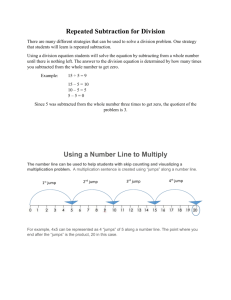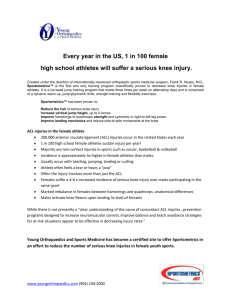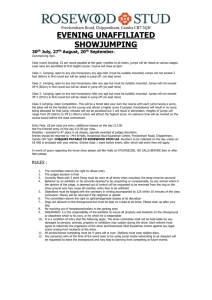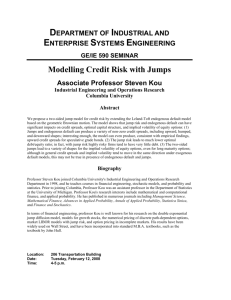ACL Prevention - US Youth Soccer
advertisement
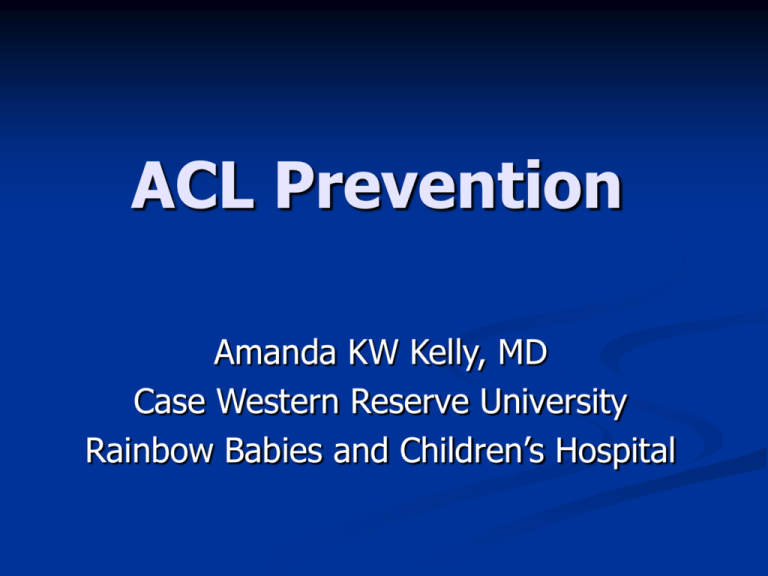
ACL Prevention Amanda KW Kelly, MD Case Western Reserve University Rainbow Babies and Children’s Hospital Outline Background Injury risk factors ACL prevention programs Background 250,000 ACL injuries/yr in USA 80 - 90% return to previous level of play $1.5 billion annual cost Typical recovery 6-9 mo > 70% ACL injuries are NON-contact Boden 2000 Physspportsmed Importance of ACL Injury Season ending injury 6-9 mo recovery time Children often must wait several yrs for repair Costly ACL Anatomy PCL LCL ACL MCL ACL: Function Keep tibia from sliding forward on the femur Injury Mechanisms Pivot Landing from jump Contact http://sportzfun.com/v-web/gallery/slideshow.php?set_albumName=soccer Injury Mechanism: Pivot Deceleration + change of direction, foot planted Causes twisting injury of knee Traction at shoe/playing surface interface Often close to another player ACL Mechanism: Pivot Importance of ground-shoe surface interface in pivot mechanism Shoe surface interface Mechanism: landing Knee slightly flexed on landing Quad pulls tibia forward Mechanism: Contact Hit on outside of leg Foot planted Twisting of knee Mechanism Pivoting with knee slightly bent, twisting knee Landing from jump: knees slightly bent, quads pull tibia forward Too much shoe traction Poor balance Uneven ground throwing off balance Risk Factors Poor landing + pivot style Stronger quads than hamstrings Shoe / playing surface interface Playing surface quality Female gender Risk Factors Landing / Pivoting with knee slightly bent Places ACL in vulnerable position Additional torsion/twisting can injury Boden 2000 Physsportsmed Risk Factors Hamstring/Quadriceps imbalance Poor hamstring strength Hamstrings protect ACL Quads stretch/stress ACL Slow activation of hamstring muscles with pivot / landing Hewett AJSM 1999, Crosier AJSM 2002, Huston 1996 AJSM, Orchard AJSM 1997, Baratta AJSM 1988 http://www.preventaclinjury.com/knee_biomechanics.htm Risk Factors Footwear Longer cleats at edge of sole with fewer, smaller cleats in the middle of the sole ’s torsional resistance Lambson 1996 AJSM Risk Factor Uneven playing surface Unexpected foot position may change muscle activation patterns Balance thrown off Boden, Orthopedics Risk Factors Female Gender 2-8x more common in girls Poor ham:quad strength Activate hams more slowly Land with knees sl bent Boys land with knees more bent Female Gender Hormonal Influences ACL has estrogen receptors Estrogen can ligament looseness Estrogen levels in girls compared to boys Estrogen ’d at specific times in menstrual cycle Studies VERY inconsistent Every phase of cycle has been implicated in at least 1 study Female Gender Knee anatomy Smaller intercondylar notch ACL may get stretched across bone and torn Athletes with bilateral ACL injuries have smaller ICN Harner 1994 AJSM, Anderson 1999 AOSSM www.hughston.com Female Gender Lower extremity alignment Women more knock-kneed May allow quad to exert more stress on ACL Data not great Nisell 1985 ActaOrthopScandSuppl www.hughston.com Prevention Strategies Shoe wear / field surface Bracing Exercise Programs Change muscle strength + activation Change landing / Pivoting patterns Sportmetrics PEP Prevention: shoe wear Shoes with lower ACL injury risk: Cleats flat, all the same size on forefoot Screw in cleats with 0.5in ht/diameter cleats Pivot disk: 10-cm circular edge on sole of forefoot Flat shoes on turf Want balance of too much / too little traction Lambson 1996 AJSM Prevention Improve playing field???? Bracing Several studies Inconclusive results No change in muscle activation patterns No ACL shown in any study Loads placed on brace during play exceeds brace BUT, many kids who have had ACL surgery FEEL more stable in brace Training Programs Balance board training Improves balance + joint position sense Caraffa, 1996, Knee Surg Sports Traum Arthrosc 20 min training sessions 87% ACL injuries 7x injury Training Programs Frappier Acceleration Training Program Frappier Acceleraton, Fargo, North Dakota Heidt, 2000, Amer Orthop Soc Sports Med 7 wk preseason training: 3d/wk 2d/wk treadmill sessions 1d/wk plyometric (jump training) ’d total # serious knee injuries ACL ’d but not significantly Training Programs Sportmetrics Hewett, 1999, Amer J Sports Med Cinicinnati Sportsmedicine Research and Education Foundation PEP (Prevent injury Enhance Performance) Mandelbaum, 2005, Amer J Sports Med Santa Monica Orthopedic and Sports Medicine Research Foundation Program Goals Emphasize proper jump/land techniques Land on balls of feet Soft landing Toe-to-heel rocking of the foot ground reactive forces Knees flexed Knees forward Discourage inward buckling of knees (knock-kneed landing) Chest over knees Hewett 1999 AJSM, Mandelbaum 2005 AJSM, Boden 2000 Physportsmed www.physsportsmed.com Training Programs Sportmetrics 6 week Preseason-training program 60 – 90 minute work-out PEP 15 minute work-out Use in place of usual pre-practice warm-up 3 d/wk PEP Program Designed Warm-up to replace usual warm-up Jog 50yd Shuttle run 50yd Backward run 50yd Stretch Calf, quad, ham, inner thigh, hip flexor 2 x 30s each correct Mandelbaum 2005 AJSM incorrect PEP Program Strength Walking lunges 20yd x 2 Russian hamstr 30s Single toe raise 30x Mandelbaum 2005 AJSM PEP Program Plyometrics Lateral hops 30s Forward hops 30s Single leg hops 30s Vertical jumps 30s Scissor jumps 30s Mandelbaum 2005 AJSM PEP Program Agilities Shuttle run 40yd Diagonal run 40yd Bounding run 50yd Knees bent Avoid upright position correct Mandelbaum 2005 AJSM incorrect Sportsmetrics Warm-up: Stretching: 3 sets, 30s each Calf, quad, hamstring, hip flexor, IT Band, low back, posterior deltoids, latissimus, pects/biceps Skipping: 2 laps Side shuffle: 2 laps Sportsmetrics Phase I: Technique Week 1 Week 2 Wall jumps Tuck jumps Broad jumps: hold landing Squat jumps Double-leg cone jumps (Side-side/front-back) 180 jumps Bounding in place 20s 20s 5 reps 10s 30s/30s 20s 20s Hewett 1999 AJSM 25s 25s 10 reps 15 s 30s/30s 25s 25s Sportsmetrics Phase II Week 3 Week 4 Wall jumps Tuck jumps Jump, jump, jump, vertical jump Squat jumps Bounding for distance Double-leg cone jumps Scissors jump Hop, hop hold landing 30s 30s 5 reps 20s 1 run 30s/30s 30s 5 rep/leg 30s 30s 8 reps 20s 2 runs 30s/30s 30s 4 rep/leg Hewett 1999 AJSM Sportsmetrics Phase III Week 5 Week 6 Wall jumps Step, jump up, down, vertical Mattress jumps (Side-side/front-back) Single-leg jumps distance Squat jumps Jump into bounding Hop, hop, hold landing 30s 5 reps 30s/30s 5 reps/leg 25s 3 runs 5 reps/leg 30s 10 reps 30s/30s 5 reps/leg 25s 4 runs 5 reps/leg Hewett 1999 AJSM Jump Definitions 180 jumps: 2-footed, rotate 180 in the air Bound for distance: start bounding in place, increase distance with each step, knees high Broad jumps-hold landing: 2-footed jump, as far as possible hold landing 5s Cone jumps: double leg, side-side, front-back Hop, hop, stick: single leg hop, stick landing 5s Jump into bounding: 2-footed jump, land on 1 leg, progress into bounding for distance Jump, jump, jump, vertical: 3 broad jumps with vertical jump after last broad jump Mattress jumps: 2-footed jump on mattress/tramp, side-side + front-back Hewett 1999 AJSM Jump Definitions Scissors jump: start in stride position, one foot in front of other, jump up alternating foot position in air Single-leg jumps, distance: single-leg hop for distance, hold landing 5s Squat jumps: standing jump, raise arms overhead, land in squat position hands on floor Step, jump up, down, vertical: 2-footed jump onto step, jump off with 2 feet, then vertical jump Tuck jump: standing, bring both knees up to chest, repeat Wall jumps: ankle bounces, arms overhead bounce up/down off of toes Hewett 1999 AJSM Sportsmetrics Weight-training: 12 reps upper body, 15 lower Abdominal curl Back hyperextension Leg press Calf raises Pullover Bench press Lat pull downs Forearm curl Warm-down, stretch Hewett 1999 AJSM http://www.sportsmetrics.net/ Training Programs Both PEP and Sportmetrics well studied Aim: Change landing / pivoting patterns Flex knees more Stop over several steps instead of sudden stop Improve hamstring strength + activation BOTH prevent ACL + other serious knee injury by achieving these aims Goals Emphasize proper landing technique RIGHT WRONG Proper landing Before Training After training Barber-Westin, 2006, AJSM; Noyes 2005 AJSM Decreased Injury ’d non-contact injuries in trained groups UT: Untrained T: Trained MC: Male Control 0.5 0.4 0.35 0.3 Injury/ 1000 exp 0.5 0.4 0.3 0.2 0.2 0.05 0.1 0 0 0.47 UT T MC Sportsmetrics Hewett 1999 AJSM 0.09 0.1 0 UT T PEP Mandelbaum 2005 AJSM Performance Enhancement vertical jump strength 10% jump height 44% hamstring strength sprint speed Improved power endurance Improved running economy Diallo JSMPF 2001, Turner JSCR 2003, Siegler JSCR 2003, Spurs EJAP 2003, Newton MSSE 1999. Witzke MSSE 2000, Hewett 1999 AJSM Improved Bone Density Female athletes participating in jump training build more bone risk for stress fracture Prevent time lost from injury risk for osteoporosis later in life References Barber-Westin SD et al. Jump-Land Characteristics and muscle strength development in young athletes. Amer J Sports Med. 2006: 34(3)1-10 Boden BP et al. Etiology and prevention of noncontact ACL injury. PhysSportsMed. 2000: 29(4) Caraffa A et al. Prevention of anterior cruciate ligament injuries in soccer: a prospective controlled study of proprioceptive training. KneeSurgSportsTraumatolArthrosc. 1996:4:19-36 Heidt RS et al. Avoidance of soccer injuries with preseason conditioning. AmJSportsMed. 2000: 28(5)659-62 Hewett TE et al. The effect of neuromuscular training on the incidence of knee injury in female athletes: a prospective study. Amer J Sports Med 1999. 27(6) 699-706 Lambson RB et al. Football cleat design and its effect on anterior cruciate ligament injuries: a 3-yr prospective study. AmJSportsMed.1996:24(2)155-9 References Mandelbaum BR, Silvers HJ, Watanabe DS. Effectiveness of a neuromusclular and proprioceptive training program in preventing anterior cruciate ligament injuries in female athletes: a 2-year follow-up. Amer J Sports Med. 2005: 33(7) 1003-9 Noyes et al. The Drop-Jump Screening Test. Amer J Sports Med. 2005: 33(2)197-207
